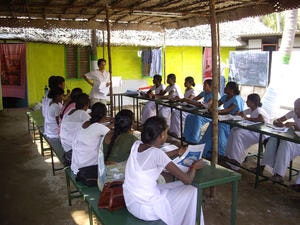40 Indian health centres now equipped to treat diabetes
Thanks to funding from the Australian High Commission Direct Aid Program, Equal Health conducted a Diabetes Health Education Program in remote Trichy, India. Volunteer, Dietician, Achamma Joseph shares her story.
The diversity of India never ceases to amaze me - the crowds, the noise and how basic life is and used to be. Having left the country about 20 years ago, in many aspects not much has changed, but yet there are a number of changes in so many other aspects.
The camp I attended in Trichy was pretty basic and rustic. It reminded me of Girl Guide camps and other similar camps that I attended in my younger days.
Work in Australia is very organised, structured and follows a strict set of guidelines, protocols, policies, standard operating procedures, etc. You are bound to follow it otherwise you risk getting into trouble or being fired. Whereas at the volunteer camp, in India, you work in extremely challenging situations which are often dynamic and volatile - there is none of the structure you find in Australia. You find yourself constantly learning to be adaptable and flexible, and it has taught me an interminable amount of patience and to provide the best under any circumstance.
At the individual consults, people are very thankful that someone has taken the time to educate, teach and guide them on how to treat or manage their condition with whatever resources they have. Since I have a very good understanding of the culture and dietary practices, it was easy for them to relate to what I said.
My main role was to do group education for the nurses and health workers. We had set a target to train 40 nurses and health workers, but the training for these workers produced such good feedback that the director of SEVAI (Society for Education Village Action and Improvement), our partner organisation in India, insisted that we train all the health workers in the organisation. He ensured that all the health workers were given time off from their regular duties and made it possible for them to attend the group education over the two week period. Therefore, we managed to train 203 health workers and gave them a basic understanding of what diabetes is, and how basic lifestyle modifications like healthy eating and exercise can help in prevention as well as to manage the condition. The health workers were also shown and taught how to use a glucometer and test blood glucose levels. Foot check and the use of monofilaments to detect sensation in their feet was demonstrated and practised.
In addition, 40 health centres were provided with a Diabetes Education Kit which included a training manual, glucometers, monofilaments, tape measures to measure waist circumference, laminated posters on foot check, exercise and healthy eating guidelines, and the use of monofilaments and glucometers.
Overall we had some good laughs on most days ... with volunteers (jokingly) asking the director to leave, women diving into young men's pockets and other humorous incidents. It helped to keep everyone's spirits up in the camp.
For me, it was hilarious to sit and watch some of our young volunteers hand wash their clothes. As I sat watching, they dipped the clothes in soapy water, scrubbed them together with their hands, dipped them back in the soapy water and hung them out to dry. Very much like washing the dishes. And I thought to myself what a huge saving in terms of water!
Going on Equal Health camps has brought home to me the meaning of the philosophy 'less is more'. It also serves as an eye opener to the realisation that we indeed are a privileged lot. It has taught me strength and courage, adaptability and flexibility and most important of all to be happy and content with what I have.
Achamma Joseph - Dietitian, Annandale, Queensland

